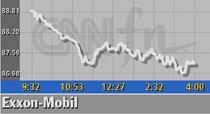|
Jeffords' economic impact
|
 |
May 24, 2001: 11:58 a.m. ET
How a shift in the balance of power in the Senate could affect your money
By Staff Writer Mark Gongloff
|
NEW YORK (CNNfn) - Vermont senator James Jeffords left the Republican Party Thursday, a move that is sending ripples through Wall Street but promises to have much broader long-term implications for U.S. businesses and consumers.
|

|
VIDEO
|
|
 Watch Sen. James Jeffords' announcement that he's leaving the GOP Watch Sen. James Jeffords' announcement that he's leaving the GOP |
|
Real
|
28K
|
80K
|
|
Windows Media
|
28K
|
80K
|
|
U.S. stock markets fell Wednesday, partly in response to investors' concerns about news reports that the Republican would become an independent, giving Democrats control of the U.S. Senate by a margin of 50-49. Jeffords announced the move at a news conference in Vermont Thursday morning.
But most analysts are saying Wall Street will recover, and indeed stocks edged higher in early trading, just after Jeffords' announcement, before falling again later in the morning.
"It might add to some short-term weakness, but it's not going to have any major effect," said Peter Cardillo, director of research of Westfalia Investments. "When you really analyze it, we had a good stock market in an era of gridlock."
The divided government of the late '90s, one of the stock market's best periods, meant Democrats couldn't pass new spending programs and Republicans couldn't pass new tax cuts.
In fact, Jeffords' switch will have no effect on the $1.35-trillion tax cut currently making its way through Congress. The Senate passed a version of the tax bill Wednesday, and Republicans hoped to quickly reconcile it with the tax bill passed by the House of Representatives in order to put a final bill on President Bush's desk by Memorial Day.
At his news conference Thursday, Jeffords said he would not interfere with the tax bill, noting his move to become an independent would be not effective until after the bill is signed into law.
"I gave my word to the president that I would not intercept or try to intervene in the signing of that bill," Jeffords said.
Changes in committee leadership
The bigger impact of Jeffords' switch is more likely to come in the long run.
"It will profoundly damage Bush's ability to accomplish his legislative goals," Ian Shepherdson, chief economist at High Frequency Economics Ltd., said Wednesday, including "drastic reforms of Social Security and Medicare, which would affect the state of public finances in the long run."
One big change will be in Senate leadership: Democrats will take over the various powerful Senate committees that determine how America's money is spent.
| |

|
Sen. Edward Kennedy, D-Mass.
Senator Kennedy could take over the Senate Health, Education, Labor and Pensions Committee. | |
For example, the Health, Education, Labor and Pensions Committee, will likely be taken over by Sen. Edward Kennedy, D-Mass., who could push for a patient's bill of rights, price controls on drugs and other measures to make life uncomfortable for drug and health-care companies.
"There may be a very different strategy coming out of the White House on health care reform," Joan Woodward, Washington research analyst with Goldman Sachs, told CNNfn's Market Call. "We might just have gridlock in Washington on health care issues."
It's also likely Democratic leadership will reward Jeffords with the chairmanship of the powerful Environment and Public Works Committee, which handles environmental policy and the building of highways, dams and other public projects.
"On telecommunications, (Sen. Ernest) Fritz Hollings, (D-S.C.) will make a difference" when he takes over the Commerce, Science and Transportation Committee, said Greg Valliere, political economist with Charles Schwab Washington Research Group. "He supports tougher regulation of the Baby Bells."
"And forget about getting any new oil or natural gas out of Alaska," Valliere said, referring in part to the expected ascension of Sen. Jeff Bingaman, D-N.M., to the chair of the Energy and Natural Resources Committee.
Meanwhile, Max Baucus, D-Mont., would take over the Finance Committee; Paul Sarbanes, D-Md., would take over the Banking, Housing and Urban Affairs Committee -- seen as a boon to lenders Freddie Mac (FRE: Research, Estimates) and Fannie Mae (FNM: Research, Estimates) -- and Robert Byrd, D-W.Va., would take over the Appropriations Committee, which handles budget issues.
Another hot-button item, Social Security reform, could be affected by a Democratic Senate.
"Social Security reform might be put off for a long time and replaced by something the Democrats would prefer, (like) a prescription drug benefit," Jeffrey Birnbaum, Washington bureau chief of Fortune magazine, told CNNfn's The Money Gang Wednesday.
'Not catastrophic' for Bush
Though this seems like a Republican nightmare, many analysts think President Bush needn't lose much sleep.
"My bottom line is that this not catastrophic for the Bush agenda," according to Valliere, who also made his remarks Wednesday.

|
|
President Bush
The president's agenda will be threatened, but analysts don't think a Democratic Senate will be catastrophic for him. | |
Valliere pointed out that the House of Representatives is still controlled by "very conservative" men, including Speaker Dennis Hastert, R-Ill., and Majority Whip Tom DeLay, R-Texas.
"A lot of actions, like going after the drug companies, will never make it through the House," Valliere said, and issues of defense spending won't be affected. "Congress is hawkish, period, and will stay hawkish."
Other analysts pointed out that the leadership shift won't change Senate voting alignments at all.
"Just because Democrats control committees doesn't mean they have an easy working coalition," said Charles Gabriel, political analyst with Prudential Securities. "There's still a coalition of conservative Democrats who will work with Republicans on key issues."
Still, the Democrats can force Republicans to face uncomfortable issues before the 2002 mid-term election.
"The Democrats have every incentive, knowing there will be rolling blackouts in California this summer, to try to get a bill to put price caps on utilities," Gabriel said. "It's good politics to blame the energy companies for high prices."
Since utility regulation contradicts the Bush energy policy, which says the government should instead help utilities generate more supply, Republicans will be forced to fight against it, a politically unpopular position.
| |

|
|
Oil companies such as Exxon-Mobil (NYSE: XOM) suffered Wednesday as investors anticipated Democratic control of the Senate. | |
A shift in energy policy could ultimately hurt energy stocks, Gabriel said, signaling a possible flight from "Bush stocks," a group of old economy issues that gained when Bush won the presidency over Vice President Al Gore and the economy slowed down.
"A year ago, people were making lists of Bush stocks and Gore stocks," Gabriel said. "Bush stocks were easy to pick -- they were stocks oppressed by the Clinton agenda, such as tobacco, or ignored, such as defense."
But these stocks could retreat when Democrats control the Senate. "We're beginning to unravel the Bush stock story, and a lot of them are ripe for rotation anyway" as the economy regains strength, Gabriel said.
Meanwhile, "alternative" energy stocks such as Ballard Power Systems Inc. (BLDP: up $1.95 to $58.21, Research, Estimates), Fuel Cell Energy Inc. (FCEL: up $1.85 to $83.75, Research, Estimates) and more should get a boost, analysts said.
"A shift to the left in the Senate would be a further positive indicator for any form of 'green' energy, encompassing everything from solar to fuel cells," said Merrill Lynch analyst Sam Brothwell.
In the end, Jeffords' defection could actually help the Republicans, if they play their cards right.
"It could almost be a relief to (Senate Majority leader) Trent Lott (R-Miss.)," Gabriel said. "The rules really favor the minority if they've got their act together." 
-- Staff Writer Catherine Tymkiw contributed to this report.
|
|
|
|
|
 |

|

